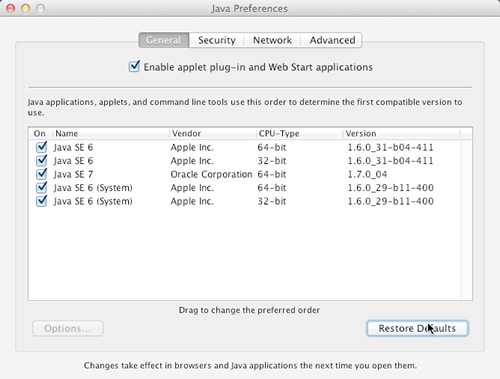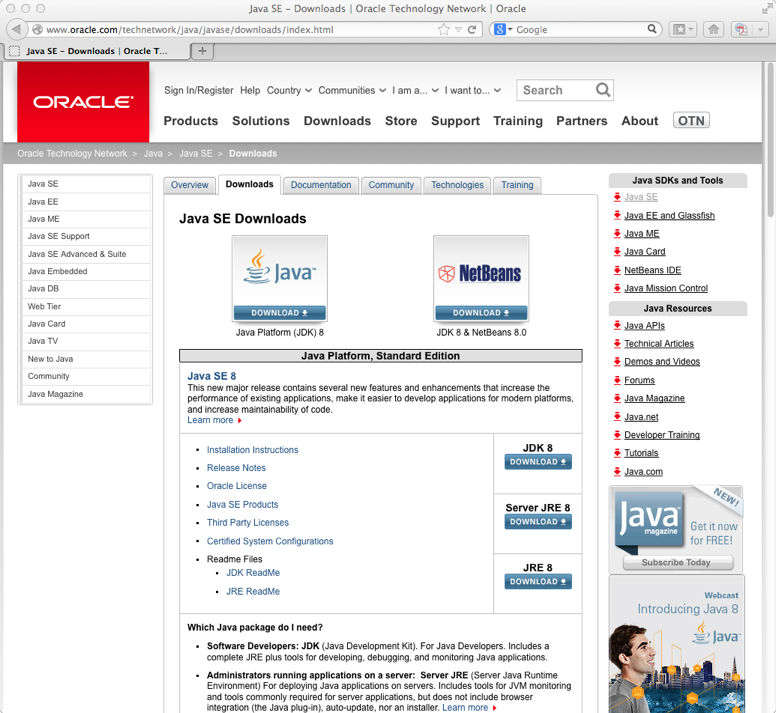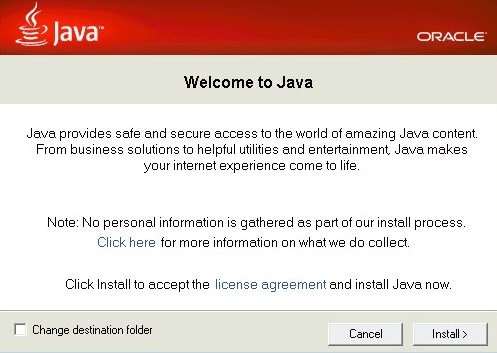- Class
Java 7 update 71 free download - Java SE Development Kit 7, Java Update for Mac OS X 10.3.9, Apple Java for OS X 10.7/10.8, and many more programs. Java 7 download free download - Apple Java for OS X 10.7/10.8, Apple Java for OS X 10.6, Java 2 SE, and many more programs.
Class Mac
- javax.crypto.Mac
- All Implemented Interfaces:
- Cloneable
This class provides the functionality of a 'Message Authentication Code' (MAC) algorithm.A MAC provides a way to check the integrity of information transmitted over or stored in an unreliable medium, based on a secret key. Typically, message authentication codes are used between two parties that share a secret key in order to validate information transmitted between these parties.
A MAC mechanism that is based on cryptographic hash functions is referred to as HMAC. HMAC can be used with any cryptographic hash function, e.g., SHA256 or SHA384, in combination with a secret shared key. HMAC is specified in RFC 2104.
Every implementation of the Java platform is required to support the following standard
Macalgorithms:- HmacMD5
- HmacSHA1
- HmacSHA256
- Since:
- 1.4
Constructor Summary
Constructors Modifier Constructor and Description protectedMac(MacSpi macSpi, Provider provider, String algorithm)
Method Summary
Methods Modifier and Type Method and Description Objectclone()Returns a clone if the provider implementation is cloneable.byte[]doFinal()byte[]doFinal(byte[] input)Processes the given array of bytes and finishes the MAC operation.voiddoFinal(byte[] output, int outOffset)StringgetAlgorithm()Returns the algorithm name of thisMacobject.static MacgetInstance(String algorithm)Returns aMacobject that implements the specified MAC algorithm.static MacgetInstance(String algorithm, Provider provider)Returns aMacobject that implements the specified MAC algorithm.static MacgetInstance(String algorithm, String provider)Returns aMacobject that implements the specified MAC algorithm.intgetMacLength()ProvidergetProvider()Returns the provider of thisMacobject.voidinit(Key key)voidinit(Key key, AlgorithmParameterSpec params)Initializes thisMacobject with the given key and algorithm parameters.voidreset()voidupdate(byte input)Processes the given byte.voidupdate(byte[] input)voidupdate(byte[] input, int offset, int len)Processes the firstlenbytes ininput, starting atoffsetinclusive.voidupdate(ByteBuffer input)Processesinput.remaining()bytes in the ByteBufferinput, starting atinput.position().Methods inherited from class java.lang.Object
equals, finalize, getClass, hashCode, notify, notifyAll, toString, wait, wait, wait
Constructor Detail
Mac
- Parameters:
macSpi- the delegateprovider- the provideralgorithm- the algorithm
Method Detail
getAlgorithm
Returns the algorithm name of thisMacobject.This is the same name that was specified in one of the
getInstancecalls that created thisMacobject.- Returns:
- the algorithm name of this
Macobject.
getInstance
Returns aMacobject that implements the specified MAC algorithm.This method traverses the list of registered security Providers, starting with the most preferred Provider. A new Mac object encapsulating the MacSpi implementation from the first Provider that supports the specified algorithm is returned.
Note that the list of registered providers may be retrieved via the
Security.getProviders()method.- Parameters:
algorithm- the standard name of the requested MAC algorithm. See the Mac section in the Java Cryptography Architecture Standard Algorithm Name Documentation for information about standard algorithm names.- Returns:
- the new
Macobject. - Throws:
NoSuchAlgorithmException- if no Provider supports a MacSpi implementation for the specified algorithm.- See Also:
Provider
getInstance
Returns aMacobject that implements the specified MAC algorithm.A new Mac object encapsulating the MacSpi implementation from the specified provider is returned. The specified provider must be registered in the security provider list.
Note that the list of registered providers may be retrieved via the
Security.getProviders()method.- Parameters:
algorithm- the standard name of the requested MAC algorithm. See the Mac section in the Java Cryptography Architecture Standard Algorithm Name Documentation for information about standard algorithm names.provider- the name of the provider.- Returns:
- the new
Macobject. - Throws:
NoSuchAlgorithmException- if a MacSpi implementation for the specified algorithm is not available from the specified provider.NoSuchProviderException- if the specified provider is not registered in the security provider list.IllegalArgumentException- if theprovideris null or empty.- See Also:
Provider
getInstance
Returns aMacobject that implements the specified MAC algorithm.A new Mac object encapsulating the MacSpi implementation from the specified Provider object is returned. Note that the specified Provider object does not have to be registered in the provider list.
- Parameters:
algorithm- the standard name of the requested MAC algorithm. See the Mac section in the Java Cryptography Architecture Standard Algorithm Name Documentation for information about standard algorithm names.provider- the provider.- Returns:
- the new
Macobject. - Throws:
NoSuchAlgorithmException- if a MacSpi implementation for the specified algorithm is not available from the specified Provider object.IllegalArgumentException- if theprovideris null.- See Also:
Provider
getProvider
- Returns:
- the provider of this
Macobject.
getMacLength
Returns the length of the MAC in bytes.- Returns:
- the MAC length in bytes.
init
- Parameters:
key- the key.- Throws:
InvalidKeyException- if the given key is inappropriate for initializing this MAC.
init
Initializes thisMacobject with the given key and algorithm parameters.- Parameters:
key- the key.params- the algorithm parameters.- Throws:
InvalidKeyException- if the given key is inappropriate for initializing this MAC.InvalidAlgorithmParameterException- if the given algorithm parameters are inappropriate for this MAC.
update
- Parameters:
input- the input byte to be processed.- Throws:
IllegalStateException- if thisMachas not been initialized.
update
Processes the given array of bytes.- Parameters:
input- the array of bytes to be processed.- Throws:
IllegalStateException- if thisMachas not been initialized.
update
Processes the firstlenbytes ininput, starting atoffsetinclusive.- Parameters:
input- the input buffer.offset- the offset ininputwhere the input starts.len- the number of bytes to process.- Throws:
IllegalStateException- if thisMachas not been initialized.
update
Processesinput.remaining()bytes in the ByteBufferinput, starting atinput.position(). Upon return, the buffer's position will be equal to its limit; its limit will not have changed.- Parameters:
input- the ByteBuffer- Throws:
IllegalStateException- if thisMachas not been initialized.- Since:
- 1.5
doFinal
Finishes the MAC operation.A call to this method resets this
Macobject to the state it was in when previously initialized via a call toinit(Key)orinit(Key, AlgorithmParameterSpec). That is, the object is reset and available to generate another MAC from the same key, if desired, via new calls toupdateanddoFinal. (In order to reuse thisMacobject with a different key, it must be reinitialized via a call toinit(Key)orinit(Key, AlgorithmParameterSpec).- Returns:
- the MAC result.
- Throws:
IllegalStateException- if thisMachas not been initialized.
doFinal
Finishes the MAC operation.A call to this method resets this
Macobject to the state it was in when previously initialized via a call toinit(Key)orinit(Key, AlgorithmParameterSpec). That is, the object is reset and available to generate another MAC from the same key, if desired, via new calls toupdateanddoFinal. (In order to reuse thisMacobject with a different key, it must be reinitialized via a call toinit(Key)orinit(Key, AlgorithmParameterSpec).The MAC result is stored in
output, starting atoutOffsetinclusive.- Parameters:
output- the buffer where the MAC result is storedoutOffset- the offset inoutputwhere the MAC is stored- Throws:
ShortBufferException- if the given output buffer is too small to hold the resultIllegalStateException- if thisMachas not been initialized.
doFinal
Processes the given array of bytes and finishes the MAC operation.A call to this method resets this
Macobject to the state it was in when previously initialized via a call toinit(Key)orinit(Key, AlgorithmParameterSpec). That is, the object is reset and available to generate another MAC from the same key, if desired, via new calls toupdateanddoFinal. (In order to reuse thisMacobject with a different key, it must be reinitialized via a call toinit(Key)orinit(Key, AlgorithmParameterSpec).- Parameters:
input- data in bytes- Returns:
- the MAC result.
- Throws:
IllegalStateException- if thisMachas not been initialized.
reset
Resets thisMacobject.A call to this method resets this
Macobject to the state it was in when previously initialized via a call toinit(Key)orinit(Key, AlgorithmParameterSpec). That is, the object is reset and available to generate another MAC from the same key, if desired, via new calls toupdateanddoFinal. (In order to reuse thisMacobject with a different key, it must be reinitialized via a call toinit(Key)orinit(Key, AlgorithmParameterSpec).
clone
Returns a clone if the provider implementation is cloneable.- Overrides:
clonein classObject- Returns:
- a clone if the provider implementation is cloneable.
- Throws:
CloneNotSupportedException- if this is called on a delegate that does not supportCloneable.- See Also:
Cloneable
- Class
- Summary:
- Nested |
- Field |
- Constr |
- Detail:
- Field |
- Constr |
Submit a bug or feature
For further API reference and developer documentation, see Java SE Documentation. That documentation contains more detailed, developer-targeted descriptions, with conceptual overviews, definitions of terms, workarounds, and working code examples.
Copyright © 1993, 2020, Oracle and/or its affiliates. All rights reserved. Use is subject to license terms. Also see the documentation redistribution policy.
Scripting on this page tracks web page traffic, but does not change the content in any way.
Do you want to run Java programs, do you want to develop Java programs, or do you want a Java Runtime Environment (JRE) on a server? If you want to run Java programs, but not develop them, download the JRE. If you want to develop Java applications, download the Java Development Kit, or JDK. The JDK includes the JRE, so you do not have to download both separately. If you need the JRE on a server and do not want the ability to run RIAs, download the Java SE Server JRE. This version of the Java SE Server JRE does not include the Java plug-in or Java Web Start support, additional tools might be removed from future versions.

We support the following platforms:
For supported processors and browsers, see Oracle JDK 7 and JRE 7 Supported Systems Configurations.
For a list of changes made to the JDK and JRE installers, see Installer Enhancements in JDK 7.
Oracle Solaris Operating System
- JDK 7 Installation on the Oracle Solaris OS - both 32-bit and 64-bit
- JRE 7 Installation on the Oracle Solaris OS - both 32-bit and 64-bit
- Server JRE 7 Installation on the Oracle Solaris OS - 64-bit
In order to run Java applets within a browser, you must install the JRE plugin manually. This does not apply to the Server JRE.


Microsoft Windows
- Windows System Requirements for JDK and JRE - Describes minimum processor, disk space, and memory requirements for the JDK and JRE for Microsoft Windows
- JDK Installation for Microsoft Windows - Describes how to install the JDK on 32-bit and 64-bit Microsoft Windows operating systems
- JRE Installation for Microsoft Windows - Describes how to install the JRE on 32-bit and 64-bit Microsoft Windows operating systems
- Server JRE Installation for Microsoft Windows - Describes how to install the Server JRE on 64-bit Microsoft Windows operating systems
- Online Installation and Java Update FAQ - Lists frequently asked questions for Windows online installation of the JRE as well as for Java Update
- JRE Installer Options - Describes how to install the JRE silently through command-line options
- Patch-in-Place and Static JRE Installation - Describes how to install the JRE in a patch-in-place or static configuration.
- Java SE Runtime Environment Update Scenarios - Describes various scenarios to demonstrate the behavior of the JRE update process.
- Autodownload Files - Lists various JRE releases and the
.cabfiles that can be used for autodownloading them.
Linux
Java Se 7 Mac Os
- JDK 7 Installation on Linux Platforms - both 32-bit and 64-bit, including RPM
- JRE 7 Installation on Linux Platforms - both 32-bit and 64-bit, including RPM
- Server JRE 7 Installation on Linux Platforms - 64-bit
In order to run Java applets within a browser, you must install the JRE plugin manually. This does not apply to the Server JRE.
Mac
Java Se 7 For Macbook
The installation of JRE and JDK of 7u6 or later require Mac OS X 10.7.3 (Lion) or later.
Java 7 For Mac Os X

